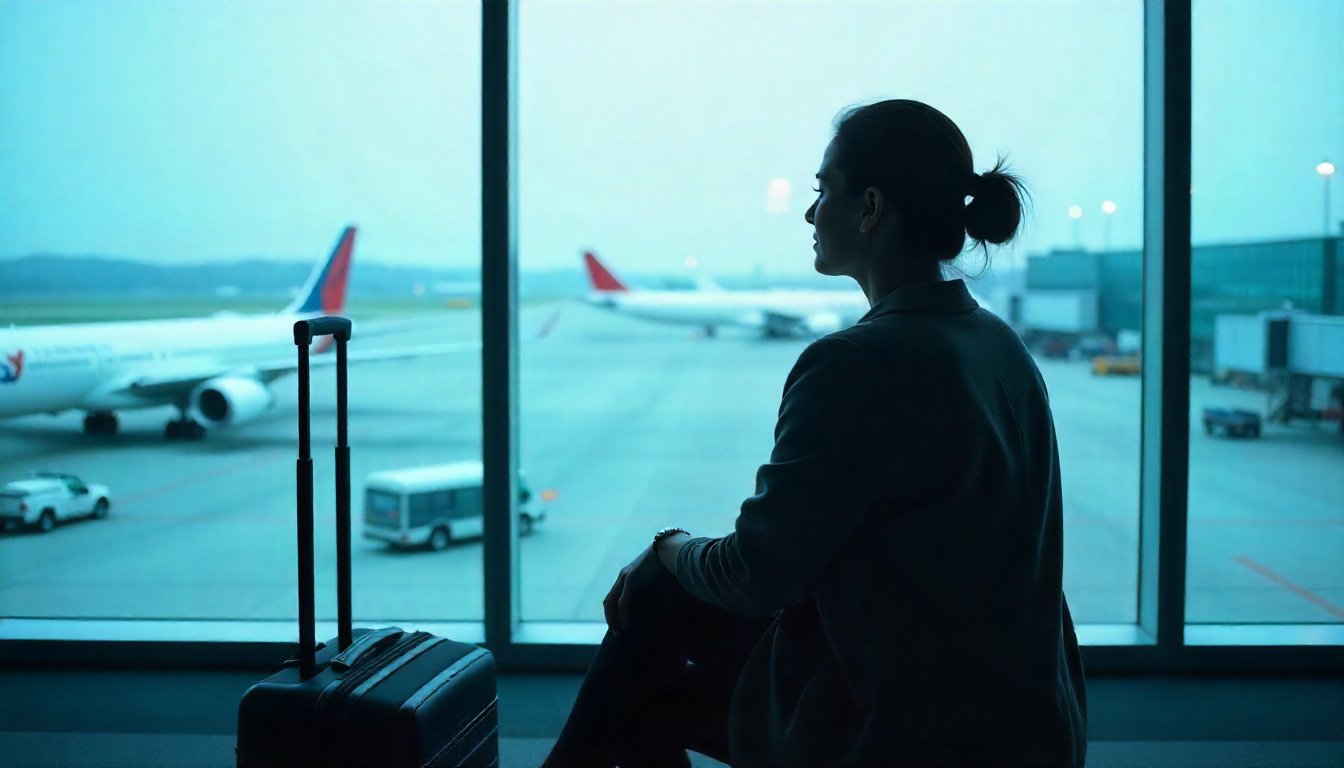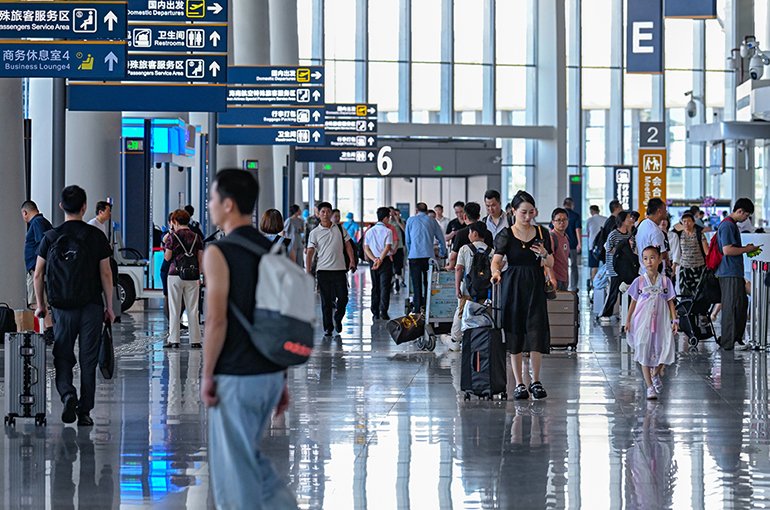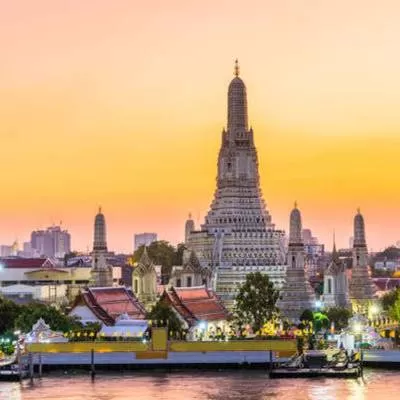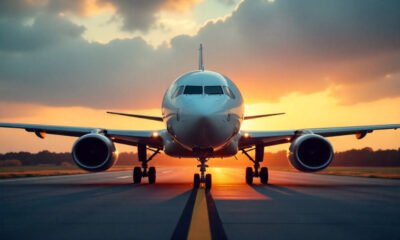Flight Buzz
Thousands of Passengers Stranded with Flights Cancelled in Europe and America, Resulting in Loss of Trip Costs and Wasting Precious Time Amid Travel Chaos – Learn How to Reclaim Your Money, Know Your Rights

Sunday, August 3, 2025
The ongoing boom in air travel in the past years has not only improved European and American interconnections but has caused a tremendous amount of travel chaos in the USA and Europe. Thousands are left stranded losing money because of the recent spout in delays and cancellations. The most recent statistics of Thursday showcase over 24,000 delays alongside over 28,000 cancellations on numerous flights between Europe and the US. The headline travel hubs such as Frankfurt, Munich, and Amsterdam Schiphol are majorly understaffed, with over half the travelers not expecting their flights in the near future. All these cancellations and delays are forcing the travel operators and airline companies to operate in a responsive environment on short notice. Passengers are bound to face uncertainty with the amount of money they expect to travel in the future, along with losing a large amount of money due to there being a lack of clarity with them being aware of their rights.
Flight Delays and Cancellations: A Growing Concern
Flight disruptions continue to impact travelers, with Frankfurt, Munich, Amsterdam Schiphol, and Austin-Bergstrom airports seeing significant delays and cancellations. These widespread disruptions lead to financial losses and wasted time for passengers, who may miss important events or spend hours, even days, in airports. Airlines and airports are under pressure to manage the fallout, making it crucial for travelers to understand their rights and how to reclaim lost costs.
Passenger Rights in the United States
In the U.S., flyer privileges regarding flight changes are not as comprehensive. While domestic delays and cancellations do not attract compensation, passengers on international flights may receive compensation as stipulated under the Montreal Convention. For delays of 3+ hours (domestic) or 6+ hours (international), passengers are entitled to automatic refunds which must be issued within 7 days (for credit card payments) and within 20 days for other payment methods.
If compensation is not granted, passengers may pursue small claims court or specialized legal services focusing on aviation disputes.
Passenger Rights in the European Union (EU Regulation 261/2004)
In Europe, EU Regulation 261/2004 offers the adversity in flight cancellation and delays stronger protections. Compensation is granted for delays of 3+ hours for short-haul flights and 4+ hours for long-haul flights. Compensation is awarded based on distance as follows, €250 for flights under 1,500 km and €600 for flights over 3,500 km.
Airlines are still entitled to compensation in extraordinary circumstances such as severe weather. However, passengers are entitled to reimbursement if the flight is delayed for 5+ hours (long-haul) or 3+ hours (short-haul).
How Travelers May Go About Reclaiming Funds
In the United States: Travelers should reach out to the customer service department of the relevant airline for the initiation of a claim. Claims that are issued, but subsequently rejected, are eligible for legal recourse via small claims court.
In the European Union: Claims are submitted usually to the relevant airline, or to the responsible national aviation authority. Rejected claims can be escalated to the European Consumer Centre, where a formal complaint can be filed.
Tertiary Claim Reimbursement Bodies
For individuals who consider the process to be insufficiently straightforward, there are multiple tertiary companies, like AirHelp, Flightright, and Skycop, that focus on the retrieval of claim compensation for delays and cancellations. These companies often operate on a no win no fee basis.
Step-by-Step Compensation Process with Leading Compensation Services
When flight disruptions occur, third-party services like AirHelp, Flightright, Skycop, and Refund.me offer an easy way for passengers to claim compensation. Here’s the process:
- AirHelp: Submit your flight details on their website. They check eligibility, submit the claim to the airline, and monitor the process. Once compensation is granted, they deduct a service fee (25%-30%) and transfer the rest to you.
- Flightright: Enter your flight details, and Flightright evaluates if you qualify under EU regulations. They handle communication with the airline and may take legal action if needed. Compensation is awarded, and Flightright takes a 25% commission.
- Skycop: Submit your claim, and Skycop evaluates eligibility. They submit the claim, handle airline follow-ups, and may pursue legal action if compensation is denied. Once compensation is received, they take a 25% fee.
- Refund.me: After submitting your flight details, Refund.me checks eligibility, submits the claim, and tracks progress. They charge a 25% service fee once compensation is received.
These companies help passengers with the documentation and legal steps involved in the claims process, making it easier for travelers to recover their lost funds. These services simplify the claims process, saving passengers time and effort in recovering compensation.
Our senior editor, Mr. Apratim Ghoshal, was stranded in Chicago last week on July 25, 2025, witnessing the mayhem of flight cancellations. “I was returning after attending the GBTA conference in Denver and was on my way back from Las Vegas after another event when Southwest Flight 591 from Las Vegas to Chicago to New York was cancelled due to weather,” he said. The airline informed him that they wouldn’t be offering any compensation. Mr. Ghoshal was rerouted to St. Louis instead and left stranded without any accommodation or food allowance. Forced to cover the costs himself, he had to pay for his own hotel and meals, which doubled his trip costs. How can stranded passengers be expected to stay at airports for extended periods without basic necessities like food and accommodation? It’s a situation that puts a huge strain on travelers already facing delays and cancellations.
TTW Founder and Editor in Chief Mr. Anup Kumar Keshan said: “Airlines often leave passengers stranded with no support when cancellations are due to weather, causing a lot of frustration. In many cases, passengers are rerouted to a different city, but with no accommodation or food allowances, leaving them to cover the costs themselves. This can easily double their travel expenses. It’s hard to imagine how travelers are expected to stay at airports or in unfamiliar cities without food or shelter. This issue affects both business and leisure travelers, who lose valuable time, money, and work opportunities in the process. We need to raise awareness about passengers’ rights and the real economic and emotional toll of being left stranded with no support.”
Flight cancellations and delays across Europe and America have left thousands stranded, causing passengers to lose significant travel costs and precious time due to overcrowded airports, missed connections, and rescheduled flights. This ongoing chaos highlights the importance of knowing passenger rights and how to reclaim money lost from these disruptions.
The growing number of flight delays and cancellations in both the United States and Europe has placed a significant burden on travelers. Understanding passenger rights is crucial for anyone affected by these disruptions. In the U.S., although passenger rights are less extensive, there are still opportunities for compensation, especially for international flights. In Europe, passengers benefit from strong regulations that ensure they receive compensation for significant delays or cancellations. Whether through direct claims or third-party services, travelers can reclaim their lost funds and ensure that they are not left to bear the costs of travel chaos.
As the number of flight disruptions continues to increase, passengers must remain informed about their rights and take the necessary steps to recover lost costs and time.
Flight Buzz
China’s Air Travel Picks Up in July, But Ticket Prices Stay Low

(Yicai) Aug. 4 — China’s civil aviation sector saw a slight uptick in July amid the summer travel rush, but ticket prices are still under pressure, with the average economy fare tumbling 7.5 percent from a year earlier, according to the latest data.
The number of passengers that flew on domestic routes in July climbed 3 percent from a year earlier to 60.3 million, according to statistics from state-backed flight information provider Air Travel Navigator. While passenger numbers on international routes surged 10 percent to 7.7 million.
Ticket sales to tourist hotspots saw much faster growth. Bookings to popular cities such as Xining in western Qinghai province as well as Lijiang and Dali in southwestern Yunnan province jumped more than 13 percent year on year, while bookings to several cities in Xinjiang Uyghur Autonomous Region surged by over 10 percent, Zhao Nan, general manager of the industry development department at Air Travel Navigator, told Yicai.
The summer travel boom this year was not as strong as expected, a marketing executive at an airline said. “The first part of July was not bad, but after the middle of the month passenger loads began to decline and it became difficult to raise prices.”
The average price of an economy class ticket on a domestic route slumped 7.5 percent in July from a year earlier to CNY840 (USD117), including fuel surcharges, according to data from flight tracking platform Flight Manager. This is also a 5 percent drop from the same period in 2019, the year before the pandemic.
Of the 20 most popular domestic routes, only the Hangzhou-Shenzhen route saw fares go up, while prices on the rest declined to various degrees. Fares on 11 of these, including the Chongqing to Beijing route, plunged by more than 10 percent from a year ago.
The July-August summer travel season is usually one of the most profitable times of the year for airlines, second only to the Chinese New Year travel rush. It is also a key time for airlines to add international flights. However, this year, international flight volumes are only back to 89.1 percent of 2019 levels, according to the latest statistics from Flight Manager.
The pattern of international routes flown by Chinese airlines has changed significantly since before the pandemic, industry insiders told Yicai. Flights to and from Central Asia, Africa and the Middle East now account for over 70 percent of international flights, while traditional long-haul routes to Europe and the United States, remain well below pre-pandemic levels due to reciprocal air rights restrictions.
In terms of the most popular international destinations, the number of flights to Japan, Malaysia, Singapore, Vietnam, the United Kingdom, the United Arab Emirates, Kazakhstan and Laos in July exceeded the same period in 2019, according to Flight Manager. However, flights to Thailand are only at 54.6 percent of 2019 levels, while those to Cambodia and the Philippines are still less than 50 percent, and flights to North America are under 30 percent of what they were before the pandemic.
Editors: Tang Shihua, Kim Taylor
Flight Buzz
Thiruvananthapuram Eyes Direct Flights to Thailand, Vietnam

Thiruvananthapuram International Airport is preparing to launch direct flights to Thailand and Vietnam in response to increasing demand from travellers. The move is set to significantly improve connectivity, reduce travel time, and enhance access to two of Southeast Asia’s most popular destinations.
Currently, passengers must take connecting flights via hubs such as Kuala Lumpur or Singapore, often adding over 10 hours to their journey. The proposed direct flights—reducing travel time to approximately five hours—will not only streamline transit but also encourage greater tourism and business activity between Kerala and Southeast Asia.
Airport authorities have confirmed they are in advanced discussions with multiple airlines and relevant regulatory bodies. Several carriers have shown interest in expanding operations from the city, including launching new routes and increasing flight frequencies to Thailand and Vietnam. Tour operators report growing interest from travellers exploring the region, especially to Ho Chi Minh City, with many combining trips to Vietnam and Cambodia.
This initiative is part of a broader strategy to enhance Thiruvananthapuram’s status as a major international hub. The airport currently offers direct flights to destinations including Dubai, Singapore, Kuala Lumpur, Doha, Sharjah, Muscat, Abu Dhabi, Dammam, and the Maldives. The addition of Southeast Asian routes will further elevate its network reach.
With rising international passenger volumes, airport authorities are investing in service upgrades and infrastructure expansion. Passenger traffic is expected to grow from current levels to approximately 3.96 million by 2030, 5.32 million by 2040, and 11.45 million by 2070.
Improved air links are also expected to generate broader economic benefits. Increased international tourist arrivals will support the local economy through growth in hospitality, retail, logistics, and manufacturing sectors. Enhanced trade ties with Southeast Asia could also attract investment in technology and industrial development.
This connectivity initiative aligns with wider regional development goals and positions Thiruvananthapuram as a key gateway for international movement of people and goods. As Southeast Asia continues to emerge as a global economic powerhouse, stronger air links will be essential for sustaining growth and prosperity across the region.
Flight Buzz
Weekend wanderlust

Young professionals across China take advantage of cheap flights, visa policies to regularly travel overseas
In Stark’s world, Friday nights usually mean going to the airport to get an international flight out of the country and returning on Monday morning, ready to head straight to work.
The 20-something Shanghai-based tech professional, who prefers to keep his real name private, has proved that you do not need to take a gap year or quit your job to travel the world.
In recent years, he has spent nearly every weekend traveling to more than 60 countries, some of them multiple times. By using different time zones and tight layovers to his advantage, he recently turned a mid-June weekend into a 42-hour Hawaiian escape without taking a day off work.
After a hop from Shanghai to Tokyo and an overnight flight across the Pacific, Stark landed in Honolulu on what was still Friday morning local time. Thanks to Hawaii’s 18-hour time difference with Beijing, he was gifted a “second Friday”.
At sunrise on Saturday, he joined early-bird hikers ascending Diamond Head — one of Honolulu’s most iconic volcanic craters. “It’s a favorite among hikers,” he noted, “and a perfect spot to view the city skyline.”
That afternoon, Stark booked a small island loop tour. From the golden stretches of Waikiki Beach to the rugged southeastern coastline, the bus made several scenic stops — each lookout revealing dramatic beauty.
Later, he visited Pearl Harbor, where the history of World War II casts a long shadow.
Stark, who works overtime to finance his travels, had arrived just in time for ongoing celebrations to mark King Kamehameha Day, one of Hawaii’s most important holidays.
He joined crowds lining the sidewalks of Honolulu as flower-draped floats and grass-skirted dancers paraded past in celebration of the king who unified the islands. “It was like watching history and festivities dance together,” he said.
However, by 2 am on Monday, he was back in Shanghai in time to go to work.
Professionals like Li Xiaojin, who works at a biopharmaceutical company in Beijing, are also redefining weekend travel. He often jets off to another country after a week’s work — sometimes without taking a full day off.
“I might leave work just two hours early on Friday, fly to Japan or Thailand, and be back by Monday morning in time to go straight to the office,” said Li, who is in his 30s.
His travel frequency has soared in recent years, and he has got the hang of making the most of his weekends abroad. For him, international weekend trips are about escaping familiarity.
“Everything is different from home. The food, the people, the streets. It’s that novelty that makes it worthwhile,” he said.
“Last year, I was going abroad once every one or two months. Now, I might travel almost every month,” he said.
His weekend trips take full advantage of the time he has available.
“No layovers, no long flights,” he said. “Two to three hours is ideal — Thailand, Japan, and Vladivostok (in Russia). That’s the limit. Once I took a Friday night flight to Shenyang, stayed overnight, then flew to Nagoya (central Japan). On the way back, I had to transit through Shanghai. Never again.”
Despite the rapid pace of his weekend outbound trips, Li does not stress over planning.
“I don’t go to a destination with a checklist. I just walk around, eat, and relax. It’s about unwinding, not cramming in attractions,” he said.
His recent getaways included Sri Lanka over Qingming Festival and Uzbekistan during the Labor Day holiday. “I don’t really care where I go — wherever it is cheap, I’ll fly. If the price and time are right, I’ll go,” he said matter-of-factly.
A rising number of China’s young professionals have shown a desire to spend weekends traveling abroad, fueled by budget flights, visa-friendly policies, and a yearning for a new experience.
Zhao Nan, general manager of the industry development department at the popular aviation service app Umetrip, said weekend outbound travel has seen a clear upward trend in recent years.
“Since 2023, with the steady recovery of international flights and increased visa facilitation, demand for short-haul cross-border trips has surged,” Zhao said.
Popular departure cities are mainly first-tier and emerging first-tier cities, with travelers placing greater emphasis on travel time, making neighboring Asian countries the preferred choice, he explained.
Outbound passenger volume from Friday to Sunday typically exceeds weekday levels, with “Friday evening departure, Sunday night return” becoming the norm, according to Umetrip’s big data monitoring.
“As international flight routes continue to expand, weekend outbound travel is expected to become increasingly routine, particularly in economically developed regions with well-connected transport hubs,” Zhao said.
The growing appeal of weekend getaways abroad is evident in Stark’s large following on the social media platform Xiaohongshu, or RedNote, where he began sharing his outbound travel experiences a few years ago with his 50,000 fans.
His travel philosophy has been to let curiosity lead the way.
For instance, part of the reason for his recent trip to Hawaii was to coincide with the local festivals.
Stark’s obsession with travel began in college, when he started taking rides on the country’s slow-moving green trains.
“Back then, I didn’t really enjoy staying on campus during weekends,” he recalled. “Sometimes I’d hop on a cheap train just to get away.”
When he discovered low-cost red-eye flights, his range widened. His first international weekend trip was to the Philippines, with a round-trip ticket purchased for less than 400 yuan ($55.80).
He did not ask his parents for money, but juggled schoolwork with freelance programming gigs to fund his getaways.
After graduation, Stark maintained a routine of taking a weekend trip every two weeks, which later evolved into weekly travel.
He made use of discount airline packages like China Eastern Airlines’ unlimited flight pass, and developed a keen eye for the best budget flights.
“My rule is, if a weekend trip’s flight costs more than 4,000 yuan, I will pass,” he said.
After China reopened its borders following the COVID pandemic, Stark resumed his traveling with renewed energy. Since then, he extended his travel range, including visits to Australia, the Netherlands, and the United Kingdom within one month. Last year alone, he visited 43 countries.
Some skeptics describe his travel style as “superficial” or “rush-hour tourism”, but Stark shrugs off the criticism.
“I don’t think travel depth depends on time,” he explained.
“You can break a long trip into multiple visits. I’ve been to Paris three times — each trip focused on something different.”
He once traveled close to the Arctic Circle just to sit inside the world’s northernmost McDonald’s restaurant for 15 minutes. “For many, it’s about experiencing a symbolic location. I didn’t need more than that,” he said of the trip.
He contrasts that with his other experiences, like waiting three hours on a windy hilltop to capture a time-lapse photograph of the sunset at Santorini in Greece.
Li, the biopharma professional, planned to make a short trip to Kuching in Sarawak, Malaysia, in July.
“I’ll just take one day off — it’s a three-day trip,” he said. “You only have so many weekends in a year. Why not make the most of them?”
“Staying at home over the weekend, time flies by. But if I’m traveling abroad, even just for two days, they will then feel full and long — it stretches the weekend. That’s why I love it,” he added.
Places like Southeast Asia and East Asia are ideal — short flights, easy visas, and low costs. Some round-trip tickets cost him less than 2,000 yuan. “You can’t beat that,” he said.
Zhang Guangyu, associate professor at the School of Tourism, History, and Culture of Southwest Minzu University, considers the rise of such “commando-style cross-border travel” a new form of consumption and a mirror of societal transition.
The rapid expansion of international flight networks and streamlined border procedures has made high-frequency travel possible, which is unlocking young consumers’ spending potential, Zhang said.
Explaining the popularity of such high-intensity travel, he said he believes it is not just a way of exploring the world but a form of social currency. Whether strolling foreign streets or venturing to the poles, these experiences are easily shared via short videos, reinforcing group identity and trend affiliation, Zhang said.
At the same time, under the pressure of fast-paced work and a culture of overachievement, young people can seize control of their limited free time through busy itineraries, treating travel as an emotional antidote and temporary escape from reality, he added.
With the arrival of the summer travel peak, many airline companies have increased or rolled out new outbound flights in response to this shift in travel behavior.
Air China plans to optimize capacity and increase the frequency of direct flights on popular routes such as one connecting Chengdu in southwestern Sichuan province with Singapore.
The airline will also launch tailored promotions, including outbound travel voucher packages and special offers for Thailand’s Songkran Festival, according to a representative from Air China.
Sichuan Airlines will offer additional promotional products for flights departing from Chengdu, such as flexible flight passes.
Weekend travelers can expect further incentives, including bonus mileage accumulation and flexible ticket changes and refund policies, aimed at making short-haul international travel more accessible and traveler-friendly, according to an official from Sichuan Airlines.
Far from being impulsive, Stark’s approach is meticulously calculated. He scans ticket prices, matches travel duration to affordability, and makes real-time adjustments based on seasonal trends. “I usually spend about 50 percent of my income on travel,” he said.
Despite his passion for travel, he insists that work always comes first.
“People assume I slack off, but I’ve never let travel affect my job performance. I plan around deadlines, work extra hours if needed, and skip trips when necessary,” he explained.
His work colleagues and managers not only support him, but were the ones who first suggested he start posting his stories online.
While maintaining a big fan base, Stark does not consider himself a full-time content creator. “Filming is secondary. I always prioritize the experience. For some trips, I don’t make them into videos — just written notes,” he said.
He occasionally receives sponsored travel offers, but most trips remain self-funded.
“I prefer it that way. The freedom matters,” he said.
To those hoping to follow in his footsteps, Stark offers simple advice: “You don’t need to travel like me. Just do what excites you. Some people love football, some love skateboarding — I happen to love changes of scenery and motion.”
He said he does not plan to slow down his hectic weekend travel unless the joy fades from it: “As long as I still find meaning in it, I’ll keep going.”
Contact the writer at yangfeiyue@chinadaily.com.cn
-

 Brand Stories2 weeks ago
Brand Stories2 weeks agoBloom Hotels: A Modern Vision of Hospitality Redefining Travel
-

 Brand Stories1 week ago
Brand Stories1 week agoCheQin.ai sets a new standard for hotel booking with its AI capabilities: empowering travellers to bargain, choose the best, and book with clarity.
-

 Destinations & Things To Do2 weeks ago
Destinations & Things To Do2 weeks agoUntouched Destinations: Stunning Hidden Gems You Must Visit
-

 Destinations & Things To Do1 week ago
Destinations & Things To Do1 week agoThis Hidden Beach in India Glows at Night-But Only in One Secret Season
-

 AI in Travel2 weeks ago
AI in Travel2 weeks agoAI Travel Revolution: Must-Have Guide to the Best Experience
-

 Brand Stories1 month ago
Brand Stories1 month agoVoice AI Startup ElevenLabs Plans to Add Hubs Around the World
-

 Brand Stories3 weeks ago
Brand Stories3 weeks agoHow Elon Musk’s rogue Grok chatbot became a cautionary AI tale
-

 Asia Travel Pulse1 month ago
Asia Travel Pulse1 month agoLooking For Adventure In Asia? Here Are 7 Epic Destinations You Need To Experience At Least Once – Zee News
-

 AI in Travel1 month ago
AI in Travel1 month ago‘Will AI take my job?’ A trip to a Beijing fortune-telling bar to see what lies ahead | China
-

 Brand Stories2 weeks ago
Brand Stories2 weeks agoContactless Hospitality: Why Remote Management Technology Is Key to Seamless Guest Experiences













You must be logged in to post a comment Login